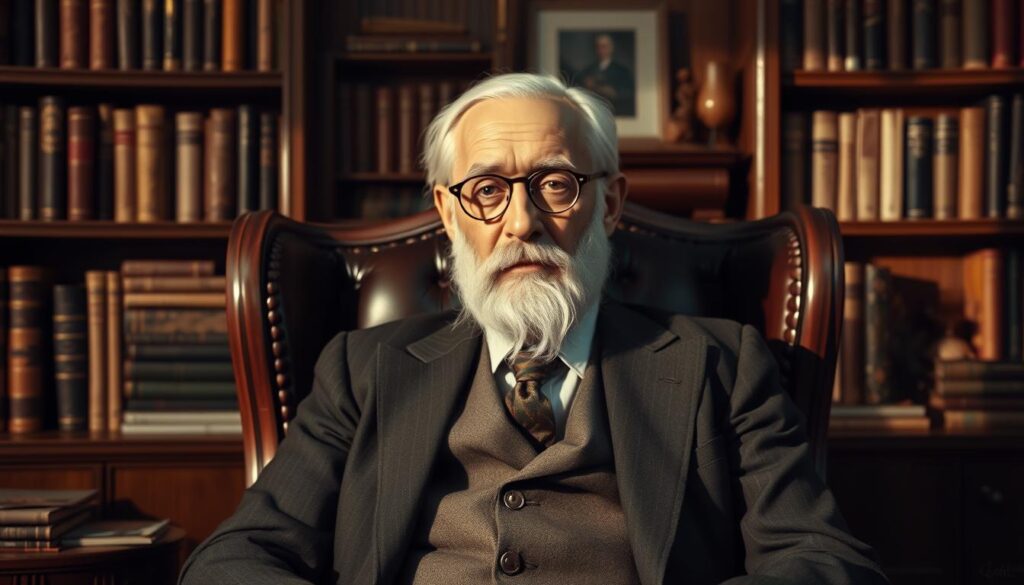Sigmund Freud, the founder of psychoanalysis, was born on May 6, 1856, in Freiberg in Mähren, Moravia, Austrian Empire (now Czech Republic)1. He created methods like free association and found transference. These are key in psychoanalysis. His work changed how we see the human mind and behavior.
As a neurologist, Freud’s work is studied and used today. His ideas on the unconscious mind and psychosexual development are important. His theories have influenced many psychologists and continue to shape our understanding of mental health.
Freud’s work opened doors for future psychologists. It helped them explore the mind and find new treatments for mental health issues. This solidified his place in psychoanalysis and Freudian theory.
Sigmund Freud’s impact on psychology is huge. His work keeps inspiring new discoveries in psychoanalysis and Freudian theory2. By looking into his life and work, we can better understand the human mind and behavior. We can also see how psychoanalysis can help improve mental health and well-being.
Key Takeaways
- Sigmund Freud was the founder of psychoanalysis and developed therapeutic techniques such as free association and transference.
- Freud’s work in psychoanalysis has had a lasting impact on our understanding of the human mind and behavior.
- His theories on the unconscious mind and psychosexual development remain influential in contemporary psychology and psychoanalysis.
- Freud’s contributions to psychology have inspired many subsequent psychologists and continue to shape our understanding of human behavior and mental health.
- His legacy in the field of psychoanalysis and Freudian theory continues to inspire new discoveries and advancements in psychology.
Early Life and Education
Sigmund Freud was born in Freiberg, Moravia, in 1856. His family moved to Vienna when he was just four years old34. This move to Vienna was key in shaping his early years. It sparked his curiosity about the human mind.
Childhood and Family Background
In Vienna, Freud grew up in a big family with six kids34. His family life gave him a glimpse into the dynamics of family relationships. These early experiences later influenced his theories on the subconscious.
Academic Pursuits
Freud graduated from the Sperl Gymnasium in Vienna in 18733. He started studying law but soon turned to medicine at the University of Vienna4. His studies deepened his interest in neurology and psychiatry.
Influence of Medical Education
At the University of Vienna, Freud focused on neurology and did research in physiology4. His work under Ernst Brücke and time at the Salpêtrière clinic in Paris under Jean-Martin Charcot were formative. They laid the groundwork for Freudian psychology and his exploration of the subconscious3.
Major Contributions to Psychology
Sigmund Freud changed psychology with his groundbreaking theories. He showed us how the unconscious mind shapes our actions5.
Theories of the Unconscious Mind
Freud said our mind has conscious and unconscious parts. The unconscious mind holds our hidden thoughts and desires. It affects our actions without us knowing6.
He also talked about the id, ego, and superego. These parts of the mind work together, he said5.
Dream Analysis and Interpretation
Freud saw dreams as a way to understand the unconscious. He believed dreams reveal our hidden desires and conflicts. This idea was key to his psychoanalytic method7.
Psychoanalysis as a Treatment Method
Freud used psychoanalysis to treat mental health issues. He used free association and the couch to help patients explore their unconscious. This helped them solve internal conflicts6.
At the heart of his method was the Oedipus complex. This concept explains a child’s feelings of love for their opposite-sex parent and jealousy of their same-sex parent5.
Legacy and Impact on Modern Psychology
Sigmund Freud’s ideas have shaped today’s psychology. His work helps therapists understand the human mind. Even as psychology has grown, his ideas remain influential.
Influence on Subsequent Psychologists
Many famous psychologists have built on Freud’s theories. They’ve added new ideas, like the unconscious mind. This has led to new ways of studying human behavior and the mind8.
Critiques and Controversies
Freud’s theories have sparked a lot of debate. Some say they’re not supported by science and are outdated, like his views on sex and gender9. Yet, his ideas keep sparking discussions in schools and universities.
Freud’s Relevance in Contemporary Society
Freudian therapy is important in mental health today. Modern versions of psychoanalysis have updated his ideas. They help tackle today’s mental health issues. Freud’s influence also reaches beyond psychology into literature, art, and culture10.
FAQ
Who was Sigmund Freud and why is he important in psychology?
What are the key components of Freud’s theory of the unconscious mind?
How did Freud’s early life influence his work in psychoanalysis?
What is the significance of dream analysis in Freud’s psychoanalysis?
What is the Oedipus complex and how does it fit into Freudian theory?
How has Freud’s legacy influenced modern psychology and therapy?
What are some common critiques of Freudian psychoanalysis?
In what ways is Freud’s work relevant in today’s society?
Source Links
- Sigmund Freud – https://en.wikipedia.org/wiki/Sigmund_Freud
- Sigmund Freud (1856–1939) – PMC – https://pmc.ncbi.nlm.nih.gov/articles/PMC8179891/
- Sigmund Freud | Biography, Theories, Psychology, Books, Works, & Facts | Britannica – https://www.britannica.com/biography/Sigmund-Freud
- Freud, Sigmund | Internet Encyclopedia of Philosophy – https://iep.utm.edu/freud/
- Sigmund Freud: Theory & Contribution to Psychology – https://www.simplypsychology.org/sigmund-freud.html
- Sigmund Freud’s 5 Most Important Contributions to Psychology – https://www.psychologs.com/sigmund-freuds-5-most-important-contributions-to-psychology/?srsltid=AfmBOoo3_rY55v6zVr53u7QFQu4BoyLIP9Orv-PFQ4tkXPAH2aYyCbZF
- Sigmund Freud’s Psychoanalytic Theories in Psychology – https://www.verywellmind.com/freudian-theory-2795845
- Are Freud and Psychoanalysis Still Relevant? – https://www.alliant.edu/blog/are-freud-and-psychoanalysis-still-relevant
- Sigmund Freud’s Theories and Legacy in Psychology – https://www.verywellmind.com/sigmund-freud-his-life-work-and-theories-2795860
- The Legacy of Sigmund Freud – Brainy Behavior – https://www.brainybehavior.com/blog/2022/12/the-legacy-of-sigmund-freud/
